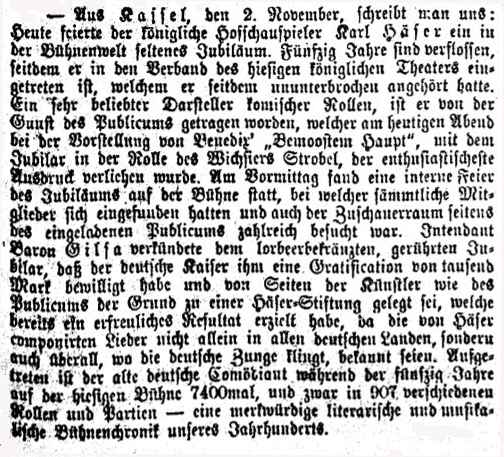
![Main heading: The Music of Gustav Mahler: A Catalogue of Manuscript and Printed Sources [rule] Paul Banks](../../images/General%20Heading3.jpg)
|
|
||||||||||
|
|
||||||||||
|
|
||||||||||
|
|
||||||||||
|
|
||||||||||
|
|
||||||||||
|
|
||||||||||
|
|
|
|||||||||
|
|
||||||||||
|
|
||||||||||
|
|
|
|||||||||
|
|
||||||||||
|
|
||||||||||
|
|
||||||||||
|
Index of Works |
|
|||||||||
|
Site Map |
|
|||||||||
|
|
||||||||||
|
|
|
|||||||||
|
|
||||||||||
|
|
|
|||||||||
|
|
|
|||||||||
|
|
||||||||||
Vorspiel mit Chor
|
Vorspiel mit Chor |
|||||||
| [September-October 1883] | |||||||
| Unknown | |||||||
|
Unknown |
|||||||
|
None |
|||||||
|
None |
|||||||
|
This is an elusive and probably spurious work: the first scholar to mention the piece was Henry-Louis de La Grange but unfortunately he gave no source references (HLG1, 716; see also HLG1F, 929):¹
Häser (1809–1887) came from a family of singers and actors: after working with various travelling groups from 1826 onwards, he accepted a permanent post, as singer (bass-baritone) and actor at Kassel in 1833 and remained there for the rest of his career. He formally retired in 1875, but continued to make guest appearances thereafter (KR, vol. 4, 1921–22). An account of his career and the jubilee celebrations appears in AGDB, 5–6:
Häser had originally trained as a musician, studying theory with Georg Christoph Grosheim (1763—1841) and was a relatively prolific composer (he had reached his op. 56 by 1871) but was probably not extensively published: only nine works are listed in the Hofmeister Monatsbericht. Nevertheless, his songs and choruses appear to have been quite widely known as is made clear in a report of the event that appeared in the Neue Freie Presse:
Fig. 1 Neue Freie Presse (7 November 1883, 7)
The brief report of the celebrations in the Neue Zeitschrift für Musik (50/79 (16 November 1883), 514–15), states that the mid-day celebration concluded with a performance, by more than a hundred members of Kassel choral societies, of Häser's 'O Wald mit deinen dustigen Zweigen' (c.f. the 1885 report cited above). None of the contemporary sources traced so far make any reference to a creative contribution by Mahler, although, as the theatre's chorus master, at the very least he might have been involved in the preparation of the performance of the re-texted version of Häser's song. |
|||||||
| Select Bibliography | |||||||
| HLG1, 716, 949 n. 10; HLG1F, 929. | |||||||

![]() https://orcid.org/0000-0002-2258-0267
©
2007-21 Paul Banks | This page was lasted edited on
20 August 2022
https://orcid.org/0000-0002-2258-0267
©
2007-21 Paul Banks | This page was lasted edited on
20 August 2022
